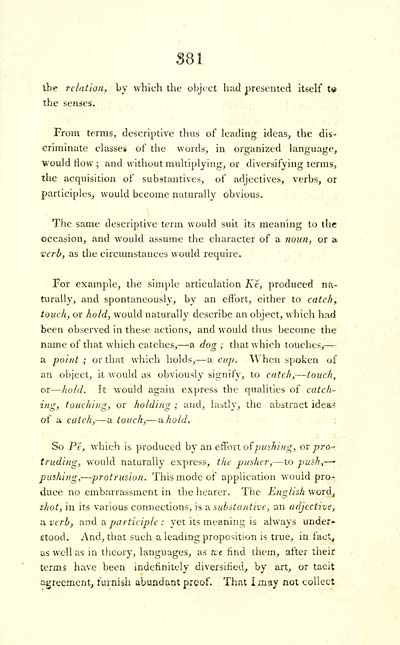Blair Collection > Celtic researches, on the origin, traditions & language, of the ancient Britons
(475)
Download files
Complete book:
Individual page:
Thumbnail gallery: Grid view | List view

881
the relation, by which the object had ^)resentcd itself t«
the senses.
From terms, descriptive thus of leading ideas, the dis-
criminate classes of the words, in organized language,
would flow; and without multiplying, or diversifying terms,
the acquisition of substantives, of adjectives, verbs, or
participles, would become naturally obvious.
The same descriptive term would suit its meaning to the
occasion, and ΛνοηΜ assume the character of a noun, or a
•terb, as the circumstances would require.
For example, the simple articulation Kt, produced na-
turally, and spontaneously, by an effort, either to catchy
touch, or hold, would naturally describe an object, which had
been observed in these actions, and would thus become the
name of that which catches, — a dog ; that which touches, —
a point ; or that Λνΐιϊοΐί holds, — a cup. When spoken of
an object, it would as obviously signif}', to catch, — touch,
or — hold. It \vould again express the qualities of catch-
ing, touching, or holding ; and, lastly, the abstract ideas
of a catch, — a touch, — -ahold.
So Pt, which is produced by an effort οι pushing, or pro•'
truding, would naturally express, the pusher, — to push, — •
pushing, — protrusion. This mode of application would pro-
duce no embarrassment in the hearer. The English word^
shot, in its various coiniections, is a substantive, an adjective,
Ά verb, Ληά a participle : yet its meaning is always under-
stood. And, that such a leadmg proposition is true, in fact,
as well as in theory, languages, as zee find them, after their
terms have been indefinitely diversified, by art, or tacit
agreement, furnish abundant proof. That I may not collect
the relation, by which the object had ^)resentcd itself t«
the senses.
From terms, descriptive thus of leading ideas, the dis-
criminate classes of the words, in organized language,
would flow; and without multiplying, or diversifying terms,
the acquisition of substantives, of adjectives, verbs, or
participles, would become naturally obvious.
The same descriptive term would suit its meaning to the
occasion, and ΛνοηΜ assume the character of a noun, or a
•terb, as the circumstances would require.
For example, the simple articulation Kt, produced na-
turally, and spontaneously, by an effort, either to catchy
touch, or hold, would naturally describe an object, which had
been observed in these actions, and would thus become the
name of that which catches, — a dog ; that which touches, —
a point ; or that Λνΐιϊοΐί holds, — a cup. When spoken of
an object, it would as obviously signif}', to catch, — touch,
or — hold. It \vould again express the qualities of catch-
ing, touching, or holding ; and, lastly, the abstract ideas
of a catch, — a touch, — -ahold.
So Pt, which is produced by an effort οι pushing, or pro•'
truding, would naturally express, the pusher, — to push, — •
pushing, — protrusion. This mode of application would pro-
duce no embarrassment in the hearer. The English word^
shot, in its various coiniections, is a substantive, an adjective,
Ά verb, Ληά a participle : yet its meaning is always under-
stood. And, that such a leadmg proposition is true, in fact,
as well as in theory, languages, as zee find them, after their
terms have been indefinitely diversified, by art, or tacit
agreement, furnish abundant proof. That I may not collect
Set display mode to: Large image | Transcription
Images and transcriptions on this page, including medium image downloads, may be used under the Creative Commons Attribution 4.0 International Licence unless otherwise stated. ![]()
| Early Gaelic Book Collections > Blair Collection > Celtic researches, on the origin, traditions & language, of the ancient Britons > (475) |
|---|
| Permanent URL | https://digital.nls.uk/75769120 |
|---|
| Description | A selection of books from a collection of more than 500 titles, mostly on religious and literary topics. Also includes some material dealing with other Celtic languages and societies. Collection created towards the end of the 19th century by Lady Evelyn Stewart Murray. |
|---|
| Description | Selected items from five 'Special and Named Printed Collections'. Includes books in Gaelic and other Celtic languages, works about the Gaels, their languages, literature, culture and history. |
|---|

